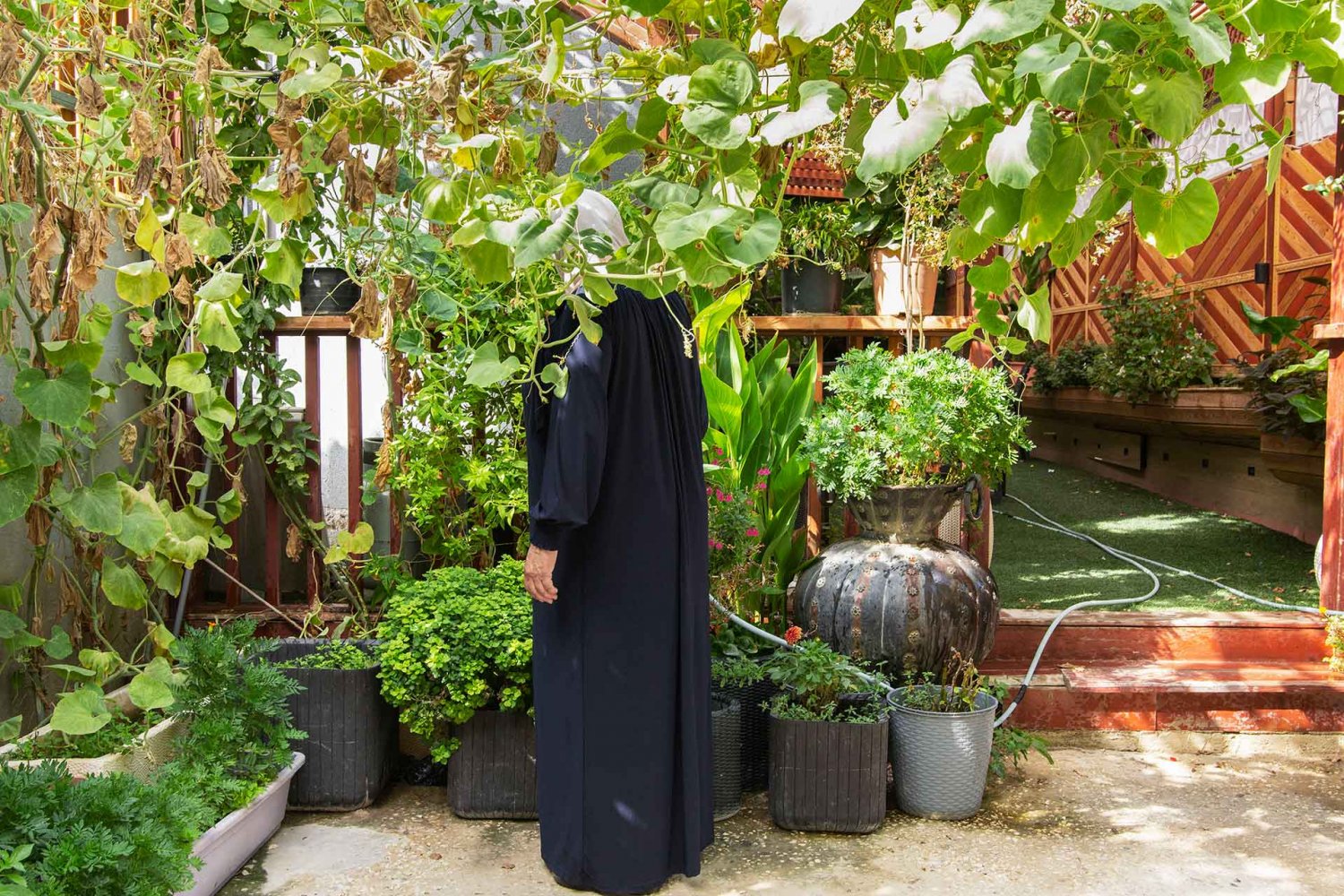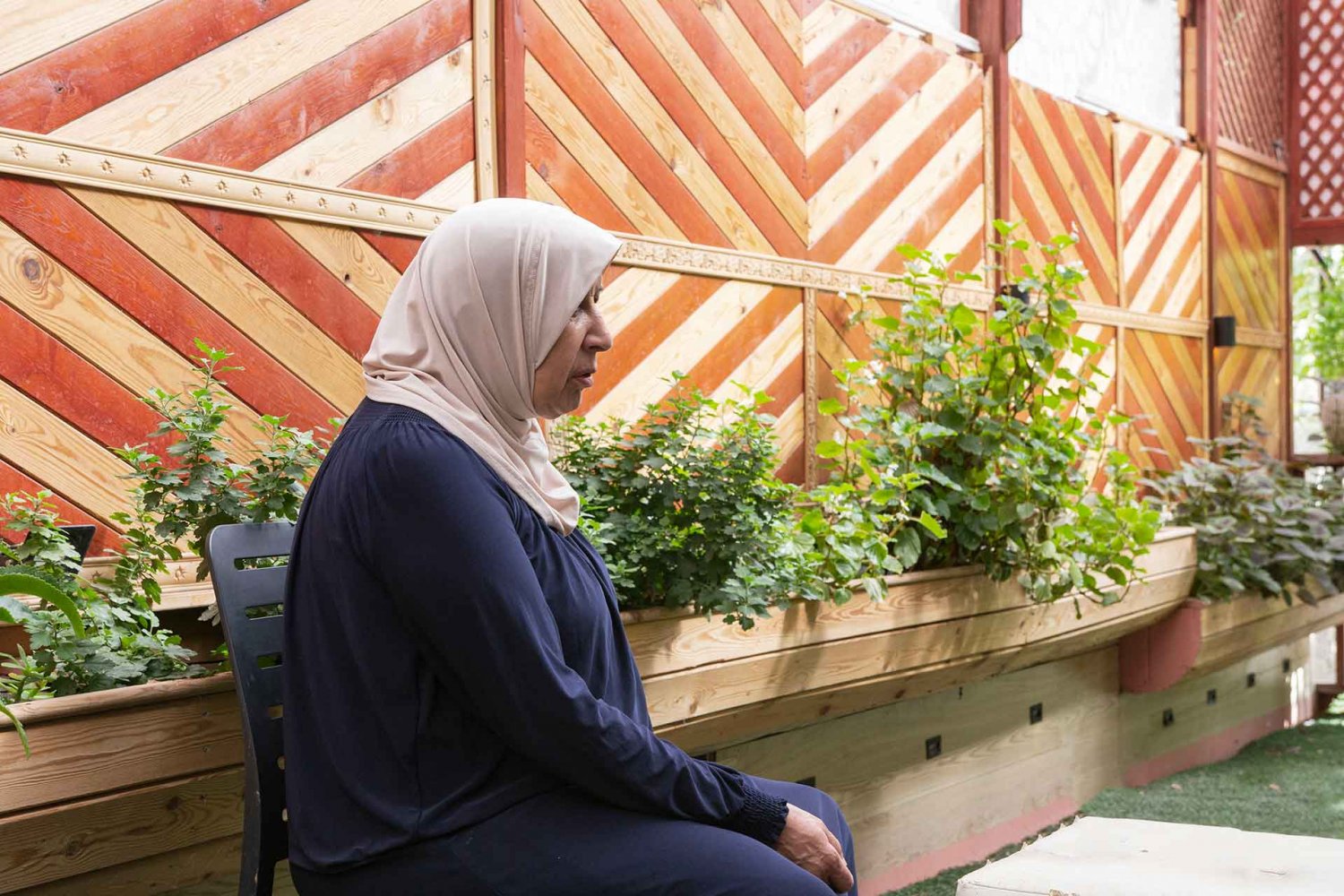Samira Rajabi, 70, is a Palestinian born in the East Jerusalem village of Silwan. She lived for 39 years in the Silwan neighborhood of Batn al-Hawa before buying an old house in the adjacent neighborhood of al-Bustan.1 She renovated the house and has been living in it for the past 30 years. Now, she is one of approximately 7,000 Palestinian Jerusalemites in Silwan under threat of expulsion.

Credit:
Mays Shkerat
Living with the Ever-Present Threat of Expulsion
Snapshot
At 70, Samira was born in Silwan and has lived there ever since. Although Samira’s home is under threat of demolition, she is determined to fight to remain on her land.
Samira’s father bought a house in Silwan in 1944, and that was Samira’s first home. She and her sisters sold the house 30 years ago, and she used her share of the sale to buy an old house in Silwan’s al-Bustan neighborhood. She has been living in it ever since along with 16 members of her family—a total of 6 adults and 11 children.
Samira explained that Israeli authorities aim to expel Palestinians from their homes in Jerusalem. “Living conditions in Jerusalem are very hard; we are barely surviving,” she shared. She also explained that they have been facing difficulties for decades. She remembers that about one year after Israel occupied East Jerusalem in 1967, the adults around her were talking about Israel’s denial of building permits to Palestinians. She was 18 years old at that time. She has been living with the fear of expulsion since that day. She intimated that while she sometimes feels frustrated, she realizes that, “I need to overcome this feeling to defend my land.”
Silwan’s Palestinian residents remain in a constant state of uncertainty regarding their housing rights. They also experience intense settler violence often supported by settler organizations with the unofficial support of the Israeli police and security forces. This has had a particularly severe impact on children.
In 2021 alone, the Wadi Hilweh Information Center in Silwan documented 2,788 arrests in Jerusalem, including Silwan: 34 boys younger than 12 years old, 707 boys between the ages of 12 and 18, 136 females, and 26 children. There has also been an increasing number of incidences of children being temporarily expelled and banned from the area.
Israeli authorities, including the Jerusalem Municipality and planning committees, have all participated in the systematic and deliberate neglect of occupied Palestinian East Jerusalem, including Silwan. Although residents pay high taxes, there has been no investment in community development. Only a tiny portion (if any) of the public budget is allocated to community services, education, economy, development, infrastructure, housing, or recreational facilities.
Samira talked about the evolution of the al-Bustan neighborhood. She described how it had been a beautiful valley full of trees, but people needed land to build houses, so they had to uproot the trees. “The population was growing, and residents had no other choice at that time.”
To control Palestinian population growth in the city, the 1973 Israeli interministerial Gafni Committee proposed that the government should aim for a demographic ratio of roughly 26.5 Palestinian to 73.5 percent Jewish residents in Jerusalem2 (see The History of Israeli Settlement Expansion in and around East Jerusalem from 1967 to 1993). Further, in 1976, the Jerusalem Municipality adopted a city master plan known as the AM/9 plan, designating al-Bustan as an open public area. Accordingly, Israeli authorities did not approve building permits for new Palestinian homes in al-Bustan; expansion and renovation of existing homes also require permits, which are almost impossible to obtain. With few other options, residents of al-Bustan built more than 90 residential structures without permits, subjecting them to future demolition orders from Israeli authorities.3
“After I renovated my home,” Samira said, “I had a visit from the occupation municipality inspector. He asked me whether I had a permit. I asked him, ‘Why, do I need your permission to fix my house?’” She concluded: “Even if I apply for a permit, I will never get it because I am Palestinian.”
In early 2005, the Jerusalem Municipality began serving demolition orders to residents of al-Bustan who had built their homes without permits in order to implement its plan to create an Israeli national park. “Every time my doorbell rings, I fear this will be the day we will be forced out of our homes said Samira.
As a result of the demolition orders, residents of al-Bustan formed a committee in 2005. They proposed a plan that would change the status of the area from “green land” to “residential” to prevent the expulsions. The municipality rejected the plan in 2009, after which the committee submitted a new, alternative plan that would develop the neighborhood without demolishing homes. The plan provides several square kilometers of gardens and planted areas, including rooftop gardens and public parks where historical artifacts are displayed and protected, as per guidelines laid out by the Jerusalem Municipality. This plan was rejected, too. However, negotiations are still in process and the residents have not given up.
Samira is adamant: “They can demolish the house, but I will never leave my land. I will set up a tent on my property and live in it.” But while she is determined to stay and fight to defend her home, she fears that her children might be arrested or killed while doing the same.
Notes
Research for this story was conducted in September 2021 by the Jerusalem Story Team.
“Inter-ministerial Committee to Examine the Rate of Development for Jerusalem, Recommendation for a Coordinated and Consolidated Rate of Development” [in Hebrew], Jerusalem, August 1973, 3.
“Al-Bustan Neighborhood – Garden of the King,” B’Tselem, September 16, 2014.

